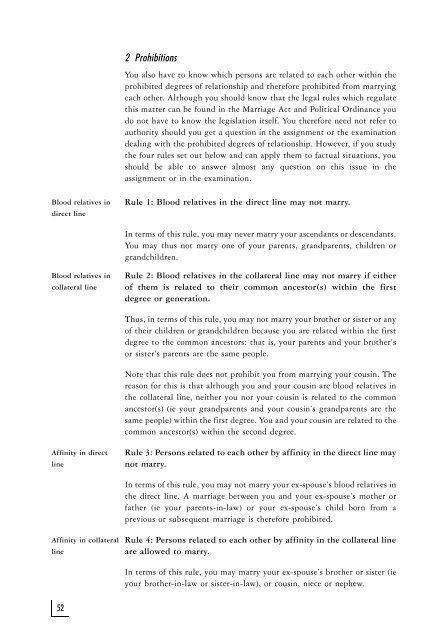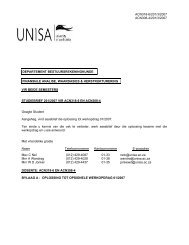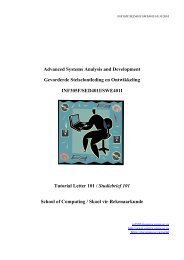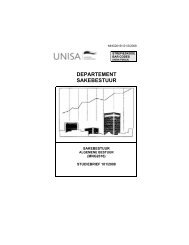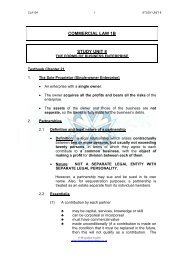key to the study guide - Name
key to the study guide - Name
key to the study guide - Name
Create successful ePaper yourself
Turn your PDF publications into a flip-book with our unique Google optimized e-Paper software.
Blood relatives in<br />
direct line<br />
Blood relatives in<br />
collateral line<br />
Affinity in direct<br />
line<br />
Affinity in collateral<br />
line<br />
52<br />
2 Prohibitions<br />
You also have <strong>to</strong> know which persons are related <strong>to</strong> each o<strong>the</strong>r within <strong>the</strong><br />
prohibited degrees of relationship and <strong>the</strong>refore prohibited from marrying<br />
each o<strong>the</strong>r. Although you should know that <strong>the</strong> legal rules which regulate<br />
this matter can be found in <strong>the</strong> Marriage Act and Political Ordinance you<br />
do not have <strong>to</strong> know <strong>the</strong> legislation itself. You <strong>the</strong>refore need not refer <strong>to</strong><br />
authority should you get a question in <strong>the</strong> assignment or <strong>the</strong> examination<br />
dealing with <strong>the</strong> prohibited degrees of relationship. However, if you <strong>study</strong><br />
<strong>the</strong> four rules set out below and can apply <strong>the</strong>m <strong>to</strong> factual situations, you<br />
should be able <strong>to</strong> answer almost any question on this issue in <strong>the</strong><br />
assignment or in <strong>the</strong> examination.<br />
Rule 1: Blood relatives in <strong>the</strong> direct line may not marry.<br />
In terms of this rule, you may never marry your ascendants or descendants.<br />
You may thus not marry one of your parents, grandparents, children or<br />
grandchildren.<br />
Rule 2: Blood relatives in <strong>the</strong> collateral line may not marry if ei<strong>the</strong>r<br />
of <strong>the</strong>m is related <strong>to</strong> <strong>the</strong>ir common ances<strong>to</strong>r(s) within <strong>the</strong> first<br />
degree or generation.<br />
Thus, in terms of this rule, you may not marry your bro<strong>the</strong>r or sister or any<br />
of <strong>the</strong>ir children or grandchildren because you are related within <strong>the</strong> first<br />
degree <strong>to</strong> <strong>the</strong> common ances<strong>to</strong>rs: that is, your parents and your bro<strong>the</strong>r's<br />
or sister's parents are <strong>the</strong> same people.<br />
Note that this rule does not prohibit you from marrying your cousin. The<br />
reason for this is that although you and your cousin are blood relatives in<br />
<strong>the</strong> collateral line, nei<strong>the</strong>r you nor your cousin is related <strong>to</strong> <strong>the</strong> common<br />
ances<strong>to</strong>r(s) (ie your grandparents and your cousin's grandparents are <strong>the</strong><br />
same people) within <strong>the</strong> first degree. You and your cousin are related <strong>to</strong> <strong>the</strong><br />
common ances<strong>to</strong>r(s) within <strong>the</strong> second degree.<br />
Rule 3: Persons related <strong>to</strong> each o<strong>the</strong>r by affinity in <strong>the</strong> direct line may<br />
not marry.<br />
In terms of this rule, you may not marry your ex-spouse's blood relatives in<br />
<strong>the</strong> direct line. A marriage between you and your ex-spouse's mo<strong>the</strong>r or<br />
fa<strong>the</strong>r (ie your parents-in-law) or your ex-spouse's child born from a<br />
previous or subsequent marriage is <strong>the</strong>refore prohibited.<br />
Rule 4: Persons related <strong>to</strong> each o<strong>the</strong>r by affinity in <strong>the</strong> collateral line<br />
are allowed <strong>to</strong> marry.<br />
In terms of this rule, you may marry your ex-spouse's bro<strong>the</strong>r or sister (ie<br />
your bro<strong>the</strong>r-in-law or sister-in-law), or cousin, niece or nephew.


